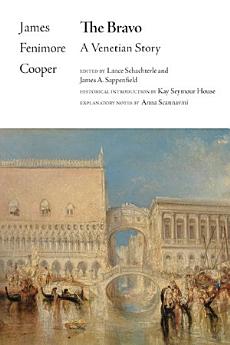The Bravo: A Venetian Story
ਜੁਲਾ 2023 · State University of New York Press
ਈ-ਕਿਤਾਬ
548
ਪੰਨੇ
family_home
ਯੋਗ
info
reportਰੇਟਿੰਗਾਂ ਅਤੇ ਸਮੀਖਿਆਵਾਂ ਦੀ ਪੁਸ਼ਟੀ ਨਹੀਂ ਕੀਤੀ ਗਈ ਹੈ ਹੋਰ ਜਾਣੋ
ਇਸ ਈ-ਕਿਤਾਬ ਬਾਰੇ
The Bravo (1831) takes place in early eighteenth-century Venice, when the "Serene Republic" had lost much of its glory, leaving its oligarchs struggling to hold on to their family wealth by manipulating the government and people through secret councils and a figure-head doge. In 1844, Cooper called it "in spirit, the most American book I ever wrote" because of its depiction of the masses duped by demagoguery and the attempts of Congress to rein in President Jackson, who Cooper saw as representing the popular will. In the novel, the low-born hero, Jacopo Frontoni, is forced to become an agent of the state because his unjustly imprisoned father languishes in the infamous state prison. On the last page, Jacopo is executed as a scapegoat for the crimes attributed to him of which he is innocent, rendering his beloved insane. Only in a subplot does a noble couple escape Venice to enjoy marriage.
The present text is based on all extant manuscript witnesses (including a lengthy deleted section) and offers extensive explanatory notes.
The present text is based on all extant manuscript witnesses (including a lengthy deleted section) and offers extensive explanatory notes.
ਲੇਖਕ ਬਾਰੇ
Lance Schachterle is Professor of English in the Department of Humanities and Arts at Worcester Polytechnic Institute. James A. Sappenfield was Professor Emeritus of English at the University of Wisconsin-Milwaukee. Kay Seymour House was Professor of English at San Francisco State University and served as Editor-in-Chief of the Writings of James Fenimore Cooper from 1990 to 2002. Anna Scannavini is Associate Professor Emerita of American Literature at the University of L'Aquila.
ਇਸ ਈ-ਕਿਤਾਬ ਨੂੰ ਰੇਟ ਕਰੋ
ਆਪਣੇ ਵਿਚਾਰ ਦੱਸੋ
ਪੜ੍ਹਨ ਸੰਬੰਧੀ ਜਾਣਕਾਰੀ
ਸਮਾਰਟਫ਼ੋਨ ਅਤੇ ਟੈਬਲੈੱਟ
Google Play Books ਐਪ ਨੂੰ Android ਅਤੇ iPad/iPhone ਲਈ ਸਥਾਪਤ ਕਰੋ। ਇਹ ਤੁਹਾਡੇ ਖਾਤੇ ਨਾਲ ਸਵੈਚਲਿਤ ਤੌਰ 'ਤੇ ਸਿੰਕ ਕਰਦੀ ਹੈ ਅਤੇ ਤੁਹਾਨੂੰ ਕਿਤੋਂ ਵੀ ਆਨਲਾਈਨ ਜਾਂ ਆਫ਼ਲਾਈਨ ਪੜ੍ਹਨ ਦਿੰਦੀ ਹੈ।
ਲੈਪਟਾਪ ਅਤੇ ਕੰਪਿਊਟਰ
ਤੁਸੀਂ ਆਪਣੇ ਕੰਪਿਊਟਰ ਦਾ ਵੈੱਬ ਬ੍ਰਾਊਜ਼ਰ ਵਰਤਦੇ ਹੋਏ Google Play 'ਤੇ ਖਰੀਦੀਆਂ ਗਈਆਂ ਆਡੀਓ-ਕਿਤਾਬਾਂ ਸੁਣ ਸਕਦੇ ਹੋ।
eReaders ਅਤੇ ਹੋਰ ਡੀਵਾਈਸਾਂ
e-ink ਡੀਵਾਈਸਾਂ 'ਤੇ ਪੜ੍ਹਨ ਲਈ ਜਿਵੇਂ Kobo eReaders, ਤੁਹਾਨੂੰ ਫ਼ਾਈਲ ਡਾਊਨਲੋਡ ਕਰਨ ਅਤੇ ਇਸਨੂੰ ਆਪਣੇ ਡੀਵਾਈਸ 'ਤੇ ਟ੍ਰਾਂਸਫਰ ਕਰਨ ਦੀ ਲੋੜ ਹੋਵੇਗੀ। ਸਮਰਥਿਤ eReaders 'ਤੇ ਫ਼ਾਈਲਾਂ ਟ੍ਰਾਂਸਫਰ ਕਰਨ ਲਈ ਵੇਰਵੇ ਸਹਿਤ ਮਦਦ ਕੇਂਦਰ ਹਿਦਾਇਤਾਂ ਦੀ ਪਾਲਣਾ ਕਰੋ।








